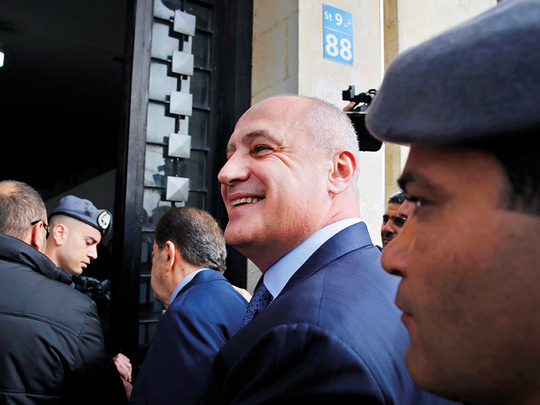
Beirut: A string of court cases and judicial investigations against Lebanese media figures is testing the country’s reputation as a forum for ideas in a region blanketed by censorship and threats to the press.
Lebanese authorities are getting tough on free speech ahead of national elections, summoning two leading talk show hosts to court over on-air remarks and sentencing an analyst to jail for comments she made in Washington about the Lebanese army.
A raft of taboos enshrined by law is shielding the country’s military, political leaders, and religious institutions from criticism.
“The Lebanese journalist used to be a pioneer for freedoms for the entire Arab world,” said Marcel Ganem, who is facing a lawsuit because of remarks made by a guest on his highly regarded talk show, Kalam Ennas, in November. “Is it possible that today Lebanese journalists are afraid of the spectre of the authorities?”
Ganem and others targeted by criminal suits and investigations say the political class is closing ranks ahead of parliamentary elections in May — the first national referendum in eight years — and trying to tamp down on the torrent of media opprobrium since a national trash crisis disgraced politicians in 2015.
“The vulnerable ‘system’ needs to be protected,” said Hanin Ghaddar, a Lebanese analyst at the Washington Institute, who was sentenced by a military court to six months in prison for comments she made at a US symposium in 2014.
Ghaddar, who lives in Washington, said she would not return to Lebanon to serve her sentence.
An outspoken critic of the militant group Hezbollah, Ghaddar charged that Lebanon’s army was showing leniency to the militia group while cracking down on other extremists.
Ghaddar’s case is “a mark of shame on Lebanon,” said Ayman Mhanna, the executive director of the Samir Kassir Foundation, a press freedoms organisation named after the late editor of Lebanon’s Al Nahar newspaper, who was assassinated in 2005.
“No politician can say that the status of freedom is acceptable in Lebanon when a military court can issue a sentence to prison or exile because of an opinion,” said Mhanna.
Justice minister Salim Jreissati said Ghaddar was accusing the army of treason, and that this was not protected by the constitutionally-enshrined principle of freedom of speech.
“She calls herself Lebanese?” Jreissati said to the AP in a phone call.
Ganem, who has hosted his show for 23 years, said he was blindsided by the charges levelled against him after he refused to testify in a criminal investigation of a guest accused of defaming Lebanon’s leaders. In a live episode, Saudi journalist Ebrahim Al Merhi had said Aoun and Parliament Speaker Nabih Berri were “partners” in “Hezbollah’s terrorism.”
The Iran-backed Hezbollah is a partner in Lebanon’s ruling coalition government and a political ally of both Aoun’s Free Patriotic Movement and Berri’s Amal Movement.
Jreissati, who belongs to Aoun’s party, said at the time that the press had lost its “moral and professional bearings.”
The episode underscored the perils of journalism in Lebanon’s charged political atmosphere.
It is illegal to “defame” Lebanon’s political leaders, its army and foreign leaders — a tempting threshold for comedians to cross in a country where foreign meddling is a staple of national politics. It is also illegal to insult religion.
Ganem’s case is still working its way through the judiciary, while new episodes of their shows air on the same Lebanese network, LBC.
Others, too, have faced harassment. In July, journalist Fidaa Itani was detained and interrogated after criticising the army’s treatment of Syrian refugees in a Facebook post. He agreed to take it down.
In November, authorities arrested the head of the Civil Islamic Coalition, Ahmad Ayoubi, on charges of defaming the president and insulting a “brotherly nation.” He was later released on bail.
Lebanon has endured a turbulent 13 years since its so-called ‘Cedar Revolution’ forced Syria’s military — and its feared intelligence services, which had directed the press and politics from behind the scenes — out of the country.
But instead of ushering a new era of press freedoms, the 2005 uprising marked the start of a wave of assassinations that overwhelmingly targeted journalists and politicians seen as critical of Damascus and its closest partner in Lebanon, Hezbollah.
Samir Kassir, a popular editorial writer at An-Nahar, was killed in a car bomb blast. The paper’s editor, Gebran Tueni, was killed in a similar blast six months later.
In the meantime, political parties sought to undermine the press syndicates, said Mhanna, the Kassir foundation director, leaving journalists today with limited recourse in the face of potentially career-ending criminal cases.
“These unions are not playing an adequate role, they are not speaking out in the face of these violations,” said Mhanna.
Cash-starved newspapers have shut down or turned to political patrons for funds, but other reporters have vowed to fight on.
“Everything they did to me, they weren’t able to silence me,” said the former talk show host May Chidiac, who was maimed in a failed assassination attempt in 2005. “We are a people raised on freedoms, and they cannot suppress us so easily,” she said.












